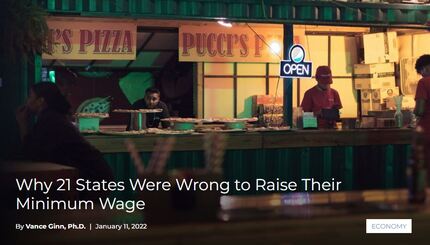 Twenty-one states rung in the New Year by raising their minimum wage, to as high as $15 per hour in California, thinking it will benefit employees in those states. But the minimum wage does the opposite of helping workers, especially for those who need it. Fortunately, 20 states, including Texas, haven’t raised theirs in more than a decade. Proponents of the minimum wage claim the law helps hard-working people with a “living wage.” But that’s not what the policy does. Economist Art Laffer put it succinctly: “A high minimum wage is extremely damaging to the poor, the minorities, the disenfranchised, and the young.” As with most policies, the effects of a policy matter more than the best intentions of those who champion the policy’s cause. The minimum wage reduces jobs and increases poverty. People even move from states with a high minimum wage to states with a lower minimum wage because there are more jobs and more opportunity. That is especially true for young people and others without much experience, on-the-job training, or education. If you want to know which policies people prefer, see how they vote with their feet. The latest Census Bureau data shows that more than 1,000 people each day moved to Texas in 2021. But the Lone Star State is not alone in attracting new businesses, jobs, and people. Other states with low minimum wages attracted more people than average while states with high minimum wages—California, New York, Illinois—are hemorrhaging people at an alarming rate. The real minimum wage for employees is always $0. If an employee adds only $8 of value per hour to a business, but the minimum wage is $15, then that person will be unemployed, hence a $0 wage. As many states have arbitrarily pushed their minimum wages higher for political reasons, low-wage workers are slowly being replaced by machines. This is the classic labor-capital tradeoff forced by government coercion through a labor market regulation rather than through voluntary negotiations by people. For example, some fast-food restaurants are replacing cashiers with kiosks, which tends to reduce hiring of lower-paid workers while oftentimes increasing higher-paid workers who create, build, and maintain the kiosks. This process increases income inequality, which is something proponents often find concerning. Although it is never a good idea to raise the minimum wage, now would be a particularly bad time. Businesses are already facing record-high cost increases from price inflation and a government-mandated minimum wage increase would just be adding insult to injury. The latest data show there are 10.6 million unfilled jobs in the U.S. which is far exceeds the 6.3 million unemployed people. While this precarious labor market situation has many causes, a high minimum wage is certainly not helping. By eliminating some low-skill jobs, the minimum wage reduces the opportunity for many people to climb the ladder of success. Without that entry-level job, many people never escape the cycle of government dependency and poverty, never gain skills, and never become eligible for higher-skill jobs. That creates a mismatch in the labor market for better jobs. Some of the compensation people receive in their first job isn’t even monetary; it’s learning skills, dignity, and purpose. A first job teaches a person how to work hard, the value of showing up on time, and how to work with others. Low-wage jobs are not designed to support a family; they’re an important first step on the ladder of success to better jobs with higher pay. Governments raising the minimum wage eliminates many of these jobs, and that cuts out the first rung on the ladder for those who are most vulnerable. Opportunity and work provide the best path to a successful, self-sufficient, rewarding life. Eliminating this pathway segregates those individuals and confines them to dependency on government. This disproportionately affects those groups (young, part-time workers, unmarried, and without a high school diploma) who rely on a low-wage first job to give them a hand up out of poverty. If we truly want a level playing field for all employees and equal opportunity for all, the last thing we want is a higher government-mandated minimum wage. https://www.texaspolicy.com/why-21-states-were-wrong-to-raise-their-minimum-wage/ Comments are closed.
|
Vance Ginn, Ph.D.
|

 RSS Feed
RSS Feed